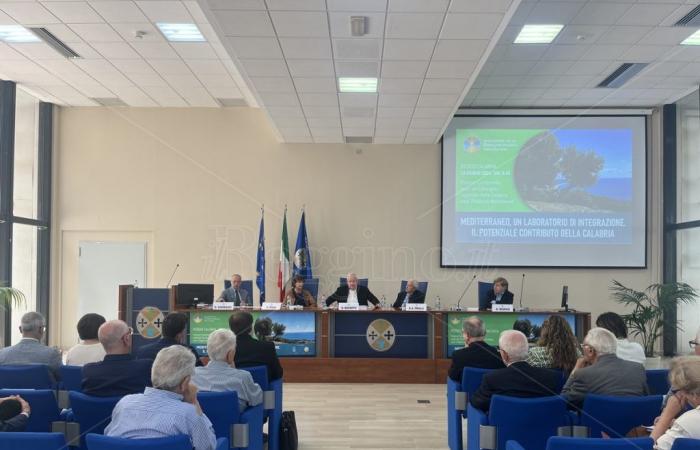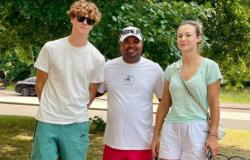«We are in a moment that my teacher and inspirer Giorgio La Pira would have defined of struggle in spe contra spem: we carry one forward hope which is that of acceptance and integration to help brothers feel safe. This while everything seems to work against this human, first of all, and Christian project. However we must not give in, remaining firm in our beliefs: there is only one truth, there is only one father and we are all Brothers».
While a Roccella Ionica we relive the drama of Cutro and we search for the missing from the boat that broke up off the coast of Locride in the night between Sunday and Mondayin Reggio the “Mediterranean, a laboratory of Integration” initiative in the presence of Cardinal Gualtiero Bassetti, former president of the CEI and today archbishop emeritus of Perugia – Città della Pieve. The meeting was promoted by the association of former regional councilors of Calabria in collaboration with the Regional Council and with the moral patronage ofarchdiocese of Reggio Calabria-Bova.
The initiative of the former regional councilors of Calabria
The room Federica Monteleone of Palazzo Campanella, seat of the Regional Councilhosted the moderated meeting Giacomo Gambassi, deputy editor of the newspaper Avvenirewhich was attended by Cardinal Gualtiero Bassetti, who attended guide of the CEI had started the project of international importance “Mediterranean, frontier of peace”inspired by thought of Giorgio La Pira, the saintly mayor of Florence, supporter of the Mediterranean Talks between the 1950s and 1960s.
After greetings from Stefano Arturo Priolopresident of the association of former regional councilors of Calabria, by monsignor Fortunato Morronearchbishop of Reggio Calabria-Bova and president of the Calabrian Episcopal Conference, Dalila Nescicoordinator for Calabria of the association of former parliamentarians, the city councilor Giuseppe Marinointerventions and testimonies.
To open the reports, the Censis researcher, Anna Italia with a focus on “The Mediterranean resource for Calabria and for the country”. To close the reflection on the “role of the Mediterranean in the new geopolitical and economic scenario” by the professor of Economic Policy at the Mediterranean University of Reggio, Domenico Marino. So the testimonies of father Gabriele Bentoglioformer undersecretary of the Pontifical Council for the Pastoral Care of Migrants and Itinerant People, director of the Migrants office of the archdiocese of Reggio Calabria-Bova, Francesco CreazzoSOS Mediterranee press officer, Mariangela Ambrogio, director of the diocesan Caritas Reggio Calabria-Bova, e Stefano Calabrò, outgoing coordinator of the Immigration and reception policies commission of Anci Calabria.
«Never derogate from human brotherhood»
«In these difficult times – continued Cardinal Gualtiero Bassetti – Città della Pieve, we must have the courage to recognize that the part of what is right is that in which brothers are allowed to be brothers and not that of those who do not fully encourage acceptance. We know they are always there forces that hinder even the best aspirations of humanity.
But we must to move on. I am 82 years old and I say to move forward along the right path, the one traced by the Gospel and the only one to build peace. I don’t have institutional roles to speak to politics but I ask the church to participate in this need to welcome brothers and then say to integrate, Not as unfortunately is also happening in Italy, taking advantage of their needs and their work.
We need to act in a project of dignity. If we are believers, we are children of the same father, we all belong to the same nature and therefore we are all brothers. Human brotherhood cannot be derogated from. If we don’t start from this concept, wars won’t end, injustices won’t end and the other will be welcomed as homo minus sapiens.” So the Cardinal Gualtiero Bassetti, former president of the CEI and today archbishop emeritus of Perugia – Città della Pieve.
Mediterranean, laboratory of integration and peace
«For millennia the The Mediterranean Sea – continued Cardinal Gualtiero Bassetti – is not only the place where people “face each other”, but also the “channel” through which ideas, cultures, people and goods pass.. The sea it witnesses not only the brutality of wars and rejections but also the trade that generates prosperity and – let us never forget the audacity of those who follow virtue and knowledge. I think about Saint Paul, more than Ulysses, and to all evangelizers of history. I also think to concrete witnesses of universal brotherhood.
For these reasons, I think that the Church needs a “Mediterranean theology” That is not born in aseptic laboratories, but lives interpreting the frontiers, is nourished by the “instinct of the people of God” and make it grow. In fact, theology is born in the life of the Church and in the challenges it faces for the love of the Gospel.
In this regard, the testimony of Giorgio La Pirathe law professor who before becoming mayor of Florence, he is a man of the South, he is a man of the Mediterranean and since he was a child he has been accustomed to contemplate the sea that is before his eyes. For this reason, La Pira elaborates an image – the so-called «historiography of the depths» – which he will develop throughout his life: «Under the storms of the surface, fearful for individual boats – he writes Piersandro Vanzan – the motionless sea depths channel, without possible deviation, impetuous currents and immobilely support the alternation of the tides.”
The theology of the Mediterranean and the historiography of the depths – underlined Cardinal Gualtiero Bassetti they therefore represent two semantic poles that need to be developed and studied together. Because if properly related, if explored in a serious and authoritative way, they can bring much fruit to the contemporary world. Especially with regards to building a culture of dialogue and peace».
Calabria and the Mediterranean
«At the moment in Calabria they live approximately 97 thousand foreign citizens many of them residents for some time and with children who attend schools in Calabriatherefore perfectly integrated without any phenomenon of racism or intolerance.
They come mainly from Morocco and also from Tunisia, Algeria and Egypt. Their contribution to demography is important, especially in regions such as Calabria which suffer from the phenomenon of depopulation. 53% of Calabrian municipalities are made up of small towns with less than 2 thousand inhabitants. While the population decreases, in contrast, foreigners increase. If there were no foreigners, therefore, there would be a a much more marked depopulation.
Migrants, on the other hand, they create job opportunities for Calabrians That they remain in the territory and who are engaged in the first and second reception circuit. Many schools where Calabrian teachers work remain open thanks to the second and third generations of foreigners who have now integrated. Therefore the iimpact can be considered positive». As Anna Italia, Censis researcher.
The visit to the reception areas
«I came to Reggio – explained the Cardinal Gualtiero Bassetti – For know and share the experience of welcoming this community. I have no institutional role, I am a bishop emeritus and I also had to face various problems during the presidency of the CEI. This, however, does not prevent me, as a Christian and as a bishop, to say a word, to encourage institutions and people to truly bring the caress of the Gospel and the church to these brothers».
In the afternoon Cardinal Bassetta will visit Casa Farias of the community of welcomed migrants and the Help Center of the diocesan Caritas. Here he will meet i volunteers for the ecclesial coordination of the landings. The visit will culminate with Eucharistic celebration presided over by the cardinal in the square in front of the Help Center. Tomorrow morning he will visit the Scalabrinians listening center to then gather in prayer in the cemetery of migrants and the poor in Armo.
The Reggio Calabria experience
“After stops in Bari (2020), Florence (2022) and Marseille (2023) in view of the next scheduled ad Alexandria of Egypt, it seemed to us it is necessary to include a territorial stop in Reggio Calabria. Here there‘hospitality has been practiced for years and there are valuable experiences in volunteering And Sai projects promoted by some municipal administrations». As Riccardo Liguori, spokesperson of the association of former regional councilors of Calabria within which he also represents the family members of the regional councilors who died in particular while carrying out their institutional illness.
A sign of hope
«The presence of Cardinal Bassetti is, especially at this juncture, a sign of great hope. As president of the Episcopal Conference he truly gave a its imprint on the ecclesiastical style of the Italian church. AND a significant paternal presence who promoted these meetings she peoples of the Mediterranean, home to great civilizations but today a tragic watery grave for our migrant brothers and sisters. However, there is a drama to deal with the strong, organized and generous response of us Calabrians, in Roccella, Reggio, Crotone.
An answer that we hope can also push Europe to be more present not to block but to open, to integrate. In this moment of pain we look with trust in the many who recognize the individual humanity of each person, regardless. This is the believing principle of the person: we are precious in the eyes of God, always. Each person is reflected in the image of God that we venerate». As Monsignor Fortunato Morrone, archbishop of Reggio Calabria – Bova.
Hospitality in Calabria
«Out of 403 Calabrian municipalities, 114 are involved in reception and integration projects. This must be it a source of pride and pride for the whole of Calabria. Above all, however, the system needs to be improved in the first reception often practiced in inadequate structures. Reception cannot be delegated to the private but must be managed as an essential public service.
The many active projects in Calabria generate a double benefit. It is no coincidence that most of them have based in small townsthe. The welcome is certainly, although not the only one, a important tool to combat depopulation. TO Sant’Alessio in Aspromonte was like this. Migrants certainly manage to keep the flame of hope». As Stefano Calabrò, outgoing coordinator of Immigration and reception policies commission of Anci Calabria and also former mayor of Sant’Alessio in Aspromonte.






